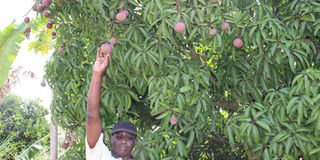Mangoes turn arid East into an agricultural hub

Mr Leonard Maweu,at his orchard of mangoes in Kee Village in the area. The fruits flourish in the dry region, thus, reaping from the semi-arid land. PHOTO | PIUS MAUNDU
What you need to know:
- Due to the harsh weather in the region, the farmer uses zai pits to grow the fruits. These are small pits dug for water harvesting during the rainy season and then used to grow crops after the rains disappear.
- In his first harvest, Maweu got more than two tonnes of fruits, attracting dozens of brokers from Nairobi, who bought them at Sh4 each.
- By coming together, the smallholder farmers have established links with other value chain actors, including exporters, pesticide dealers and mango processing firms.
A drive along Machakos-Wote Road leaves visitors shocked as most crops along the way have dried up.
Classed as semi-arid, the region normally gets sporadic rainfall that ends as soon as it starts, leaving the residents at the mercy of an unending dry spell.
However, amidst the gloom, Leonard Maweu, 64, is growing fruits that flourish in the dry region, thus, reaping from the semi-arid land.
The retired Kenya Tea Development Agency accountant grows mainly mangoes on 12 acres in Soma village, on the border of Machakos and Makueni counties.
He started the venture four years ago soon after retiring, growing hundreds of seedlings, but ended up with only 300 mango, 150 orange, 100 avocado and 20 lemon trees.
“The rest died due to the harsh weather but I had learnt a lesson, which was that I stick to mangoes.”
Maweu expanded his mango acreage introducing new varieties recommended by a local agriculture research station.
“I grow Apple, Eden, Tommy Atkins, Ngowe, Van Dyke, Sensation and Kent varieties that yield more produce and fetch higher prices in the market. They are better than the traditional varieties that grow into a big tree but yield little.”
Due to the harsh weather in the region, the farmer uses zai pits to grow the fruits. These are small pits dug for water harvesting during the rainy season and then used to grow crops after the rains disappear.
VALUE CHAIN
“I prepare pits measuring 60 by 60 by 60cm. I then put potting mix in the pit and mix with the soil. Later, I add some garden soil and then return the scooped soil in the hole. I, thereafter, place the seedling in the hole, stabilise the base with soil and mulch and water thoroughly,” explains Maweu, who draws water from a well and sparingly applies it on each of his fruits using an inverted bottle.
While planting the mangoes, he leaves at least 20m from one tree to another. He harvests 600 fruits per tree per season and sells each mango for between Sh8 and Sh20.
Using the technique, Maweu, who used to make at least Sh70,000 from the sale of mangoes every season made Sh121,000 from the sale of the fruits last season.
In his first harvest, Maweu got more than two tonnes of fruits, attracting dozens of brokers from Nairobi, who bought them at Sh4 each.
This did not give him good money though due to low prices, but Lady Luck struck in the name of Kenya Agricultural Productivity and Agribusiness Project (Kapap), a government-donor funded programme.
Kapap, which was started in the area in 2005, has worked with fruit farmers to ensure they keep brokers at bay to earn more.
The result is the Makueni Fruit Value Chain Investment Co-operative Society, a farmers’ society registered in 2014, and led by Maweu. It has 2,532 members drawn from Mbooni, Makueni and Kaiti sub-counties.
By coming together, the smallholder farmers have established links with other value chain actors, including exporters, pesticide dealers and mango processing firms.
Through the group, they are currently selling their produce to major fruit processing factories in Mombasa and Thika and exporters eying the Middle East market. Last season they earned a total of Sh40 million from their produce.
“Most of farmers under Kapap have seen a rise of 30 per cent in their incomes,” said Esther Wambua, Kapap’s head in the region.
The steady supply in mangoes has made the Makueni County Government set up a processing factory at Kalamba Shopping Centre. Farmers have acquired shares in the outfit.





